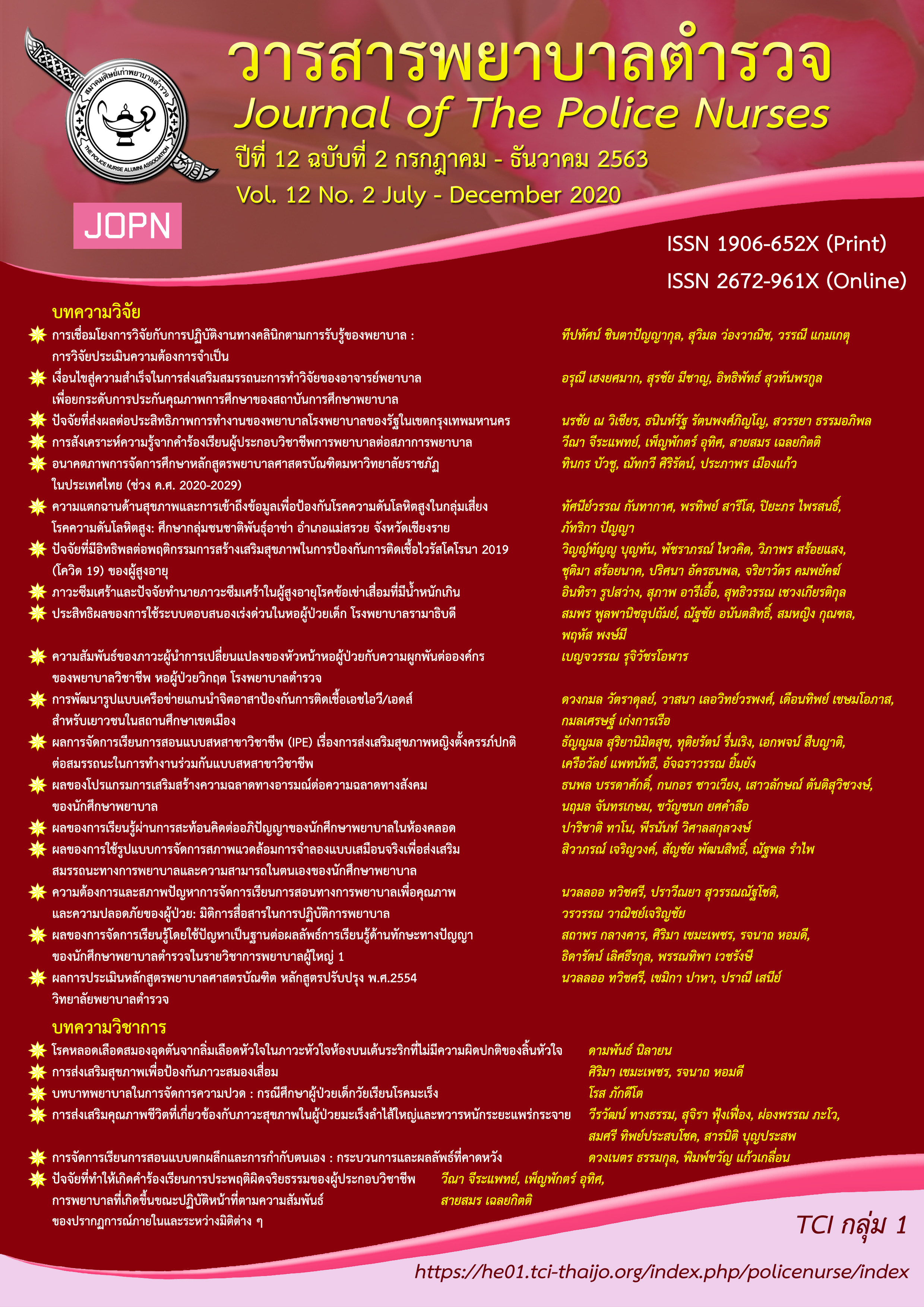A CLINICAL RESEARCH-PRACTICE NEXUS AS PERCEIVED BY NURSES: NEEDS ASSESSMENT RESEARCH
Keywords:
research-practice nexus, evidence, practice-based evidence, needs assessment researchAbstract
This needs assessment research was aimed to evaluate the needs of a clinical research – practice nexus (RPN) by prioritizing the urgent needs that require to be developed, causing analysis, and determining guideline for the promotion. Four hundred and eighty-nine registered nurses and ten key informants were recruited by using purposive sampling technique from Ramathibodi hospital, Mahidol university. The instruments used for data collection were the demographic data form and the needs assessment for RPN questionnaire. The needs assessment for RPN questionnaire was tested for its content validity. Cronbach’ s alpha coefficient reliabilities were .916 - .925. Omega coefficient reliabilities were .486 - .606. The construct validity of this instrument fitted with the empirical data (c2(41, N=489) = 51.393, p = .128, CFI = .996, TLI = .994, RMSEA = .023, SRMR = .020). Data were analyzed by using descriptive statistics, the Modified Priority Needs Index (PNImodified) and content analysis.
The results showed that: 1) nurses’ needs that require to be developed were capability in reading research (.43), capability in nursing practice (.39), and capability in RPN (.31) respectively, and 2) cause analysis found that nurses have been cultivated to be practitioners from the beginning. Barriers to promoting academic success among nurses were workload in taking care of a large number of patients and lack of capacity in searching and reading research articles. The guidelines for enhancing nurses to utilize the RPN in clinical practice were that having a nurse mentor, using proper technology at work, promoting reading research articles skills related to working context, and sharing advantages of utilizing the RPN in nursing practice.
Downloads
References
Altschuld, J. W. (2004). Emerging dimensions of needs assessment. Performance Improvement, 43(1), 10-15.
Altschuld, J. W., Hung, H.-L., & Lee, Y.-F. (2014). Needs assessment and asset/capacity building: A promising development in practice. In J. W. Altschuld & R. Watkins (Eds.), Needs assessment: Trends and a view toward the future. New Directions for Evaluation, 144, 89–103.
Deng, L., & Chan, W. (2017). Testing the difference between reliability coefficients alpha and omega. Educational and psychological measurement, 77(2), 185–203. https://doi.org/10.1177/0013164416658325
Fiset, V. J., Graham, I. D., & Davies, B. L. (2017). Evidence-based practice in clinical nursing education: A scoping review. Journal of Nurse Education, 56(9), 534-541.
Garnham, B., Cheek, J., & Alde, P. (2009). The research/ practice nexus: Underlying assumptions about the nature of research uptake into practice in literature pertaining to care of the older person. International Journal of Older People Nursing, 4(3), 219-226.
Hanucharurnkul, S. (2016). Improvement science. Thai Journal of Nursing and Midwifery Practice, 3(2), 1-14.
Irwing, P., Booth, T., & Hughes, D. V. (2018). The Wiley handbook of psychometric testing: A multidisciplinary reference on survey, scale and test development. Chichester, UK: John Wiley & Sons.
Puttaruksa, L., Subgranon, R., & Othaganont, P. (2016). Factors leading to success in the implementation of evidence-based nursing practice of professional nurses. The Journal of Faculty of Nursing Burapha University, 24(3), 94-103.
Leach, M. J., & Tucker, B. (2018). Current understandings of the research-practice gap in nursing: A mixed-methods study. Collegian, 25(2), 171–179.
Lemoncello, R., & Ness, B. (2013). Evidence-based practice & practice-based evidence applied to adult, medical speech-language pathology. Perspectives on Gerontology, 18(1), 14-26.
McKeon, P. O., & McKeon, J. M. M. (2015). Evidence-based practice or practice-based evidence: What’s in a name?. International Journal of Athletic Therapy & Training, 20(4), 1-4.
Melnyk, B. M., Fineout-Overholt, E., Gallagher-Ford, L., & Kaplan, L. (2012). The state of evidence-based practice in US nurses: Critical implications for nurse leaders and educators. The Journal of Nursing Administration, 42(9), 410-417.
Melnyk, B. M., Gallagher-Ford, L., Thomas, B. K., Troseth, M., Wyngarden, K., & Szalacha, L. (2016). A study of chief nurse executives indicates low prioritization of evidence-based practice and shortcomings in hospital performance metrics across the United States. Worldviews on Evidence-Based Nursing, 13(1), 6-14.
Wambaugh, J. L. (2007). The evidence-based practice and practice-based evidence nexus. Perspectives on Neurophysiology and Neurogenic Speech and Language Disorders, 17(2), 14-18.
Wongwanich, S. (2019). Needs assessment research (4th eds). Bangkok: Chulalongkorn University Press.
Yoder, L. H., Kirkley, D., McFall, D. C., Kirksey, K. M., StalBaum, A. L., & Sellers, D. (2014). Staff nurses’ use of research to facilitate evidence-based practice. American Journal of Nursing, 114(9), 26-37.
Downloads
Published
How to Cite
Issue
Section
License
ผลงานที่ได้ตีพิมพ์แล้วจะเป็นลิขสิทธิ์ของวารสารพยาบาลตำรวจ















